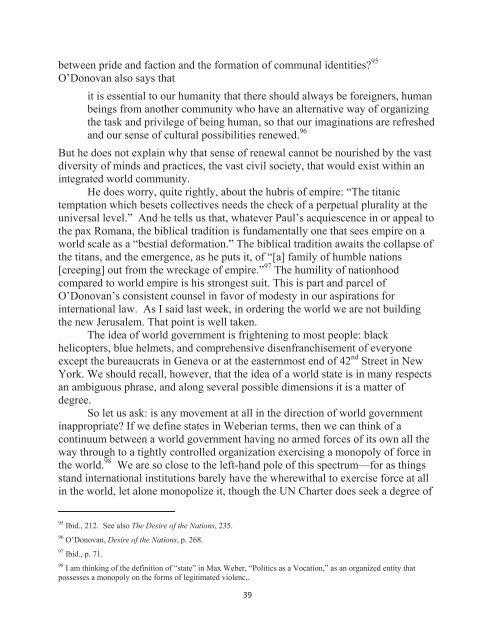International Legal Evangelism: Intelligence, Reconnaissance & Missions
International Legal Evangelism: Intelligence, Reconnaissance & Missions
International Legal Evangelism: Intelligence, Reconnaissance & Missions
Create successful ePaper yourself
Turn your PDF publications into a flip-book with our unique Google optimized e-Paper software.
etween pride and faction and the formation of communal identities? 95<br />
O’Donovan also says that<br />
it is essential to our humanity that there should always be foreigners, human<br />
beings from another community who have an alternative way of organizing<br />
the task and privilege of being human, so that our imaginations are refreshed<br />
and our sense of cultural possibilities renewed. 96<br />
But he does not explain why that sense of renewal cannot be nourished by the vast<br />
diversity of minds and practices, the vast civil society, that would exist within an<br />
integrated world community.<br />
He does worry, quite rightly, about the hubris of empire: “The titanic<br />
temptation which besets collectives needs the check of a perpetual plurality at the<br />
universal level.” And he tells us that, whatever Paul’s acquiescence in or appeal to<br />
the pax Romana, the biblical tradition is fundamentally one that sees empire on a<br />
world scale as a “bestial deformation.” The biblical tradition awaits the collapse of<br />
the titans, and the emergence, as he puts it, of “[a] family of humble nations<br />
[creeping] out from the wreckage of empire.” 97 The humility of nationhood<br />
compared to world empire is his strongest suit. This is part and parcel of<br />
O’Donovan’s consistent counsel in favor of modesty in our aspirations for<br />
international law. As I said last week, in ordering the world we are not building<br />
the new Jerusalem. That point is well taken.<br />
The idea of world government is frightening to most people: black<br />
helicopters, blue helmets, and comprehensive disenfranchisement of everyone<br />
except the bureaucrats in Geneva or at the easternmost end of 42 nd Street in New<br />
York. We should recall, however, that the idea of a world state is in many respects<br />
an ambiguous phrase, and along several possible dimensions it is a matter of<br />
degree.<br />
So let us ask: is any movement at all in the direction of world government<br />
inappropriate? If we define states in Weberian terms, then we can think of a<br />
continuum between a world government having no armed forces of its own all the<br />
way through to a tightly controlled organization exercising a monopoly of force in<br />
the world. 98 We are so close to the left-hand pole of this spectrum—for as things<br />
stand international institutions barely have the wherewithal to exercise force at all<br />
in the world, let alone monopolize it, though the UN Charter does seek a degree of<br />
<br />
95 Ibid., 212. See also The Desire of the Nations, 235.<br />
96 O’Donovan, Desire of the Nations, p. 268.<br />
97 Ibid., p. 71.<br />
98 I am thinking of the definition of “state” in Max Weber, “Politics as a Vocation,” as an organized entity that<br />
possesses a monopoly on the forms of legitimated violenc,.<br />
<br />
39

















